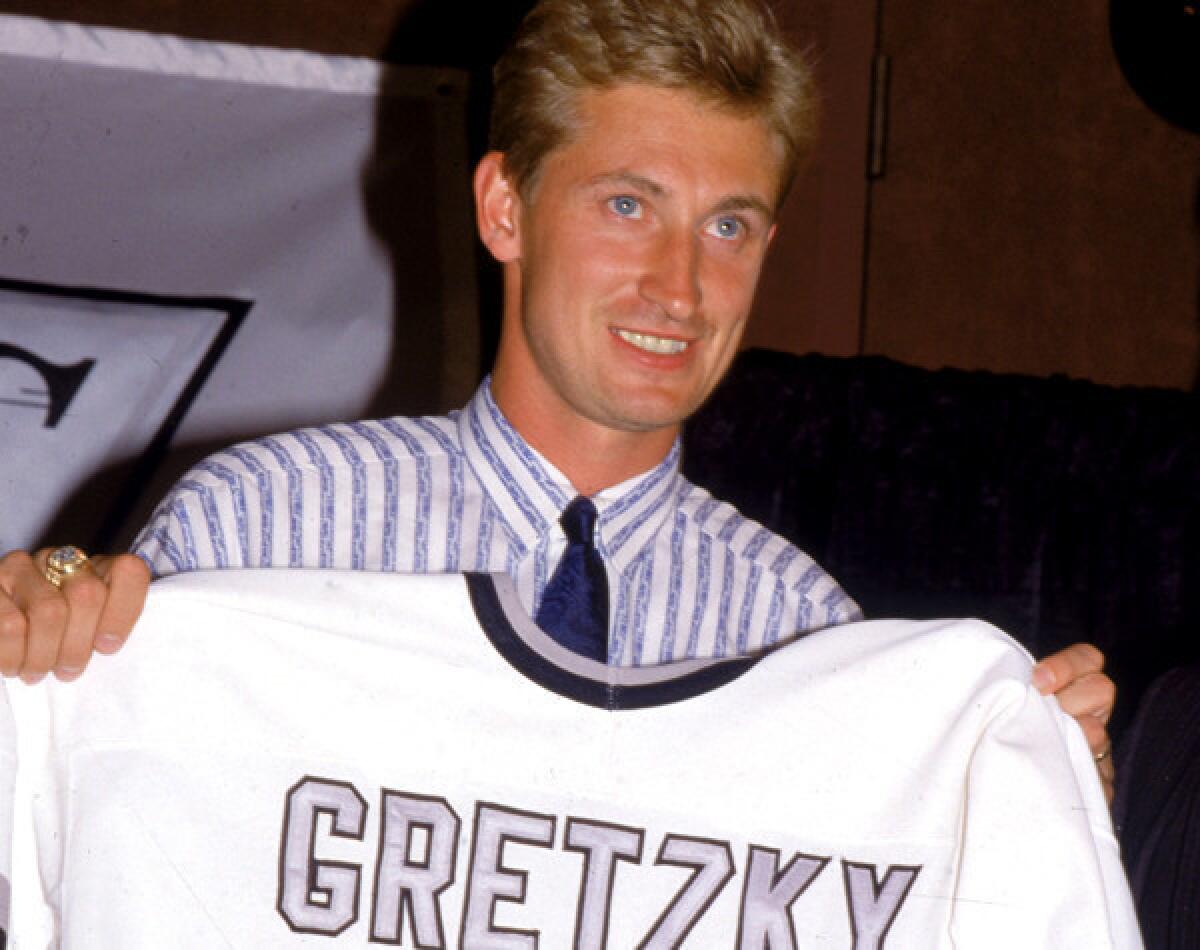The Wayne Gretzky trade: How great was that?

- Share via
Imagine a room full of serious hockey people speaking a common language — lifers used to evaluating talent in Medicine Hat, Alberta, and in Moose Jaw, Saskatchewan, on consecutive nights.
Then the polar opposite of a hockey lifer shows up and says that the Los Angeles Kings could be acquiring the game’s greatest player, Wayne Gretzky. He tells the scouts that the franchise might have to surrender several draft picks … so plan for the upcoming entry draft accordingly.
Serious men, serious hockey people, thought then-Kings owner Bruce McNall could not possibly be serious that June day in 1988.
“They all looked at me like I was gone,” McNall said. “A bunch of Canadian guys and they’re looking at this kid from California: ‘Yeah, you’re going to get Gretzky. OK, fine, have another drink.’ It was almost dismissed.”
Twenty-five years later, McNall giggled his trademark giggle.
Laughter was not the prevailing reaction 25 years ago Friday, the day McNall and then-Edmonton Oilers owner Peter Pocklington turned what seemed wildly impossible into the biggest hockey deal ever — one that transformed the NHL.
Gretzky, Mike Krushelnyski and Marty McSorley were traded from the Oilers to the Kings for Jimmy Carson, Martin Gelinas, three first-round draft choices and $15 million.
Canada cried. So did Gretzky at his farewell news conference in Edmonton. Pocklington said he received death threats over the Gretzky trade, and Gretzky’s actress wife, Janet Jones, was unfairly compared to a meddling Yoko Ono.
Los Angeles veered between shock, awe and curiosity.
Pundits scrambled for valid comparisons and were forced to leave hockey to do so. Babe Ruth’s sale from Boston to the New York Yankees looked to be about the best fit. It’s not often you can slip 1919 into a modern-day trade story.
“You hang the Mona Lisa in the Louvre, not some curio shop in downtown Lyon,” Times columnist Jim Murray wrote.
“Gretzky will fill the seats. If he can fill the nets too he’ll be the biggest bargain since Babe Ruth. The game needs glamour more than goals. He’s already pulled the hat trick. He’s put hockey on Page 1. In Los Angeles. In August.”
So many years later, the trade is still creating front-page headlines and generating television viewership in Canada. This week, the cable network Sportsnet is running a five-part series on the trade.
Tuesday’s offering included interviews with Pocklington, McNall, Carson, former Oilers executive Glen Sather and Luc Robitaille, who is now the Kings president of business operations.
There has been no shortage of literature devoted to Gretzky. McNall has written a book, and so has Pocklington, cheekily calling it “I’d Trade Him Again.” (Gretzky wrote the foreword to the Pocklington book.)
Stephen Brunt, a Canadian author and sports columnist, produced a comprehensive offering, “Gretzky’s Tears,” in 2009, and noted director Peter Berg’s ESPN documentary, “30 for 30: Kings Ransom,” came out the same year. Gretzky cooperated with the Berg project but has not been widely available leading up to the 25th anniversary.
But that hasn’t stopped most of the principals from offering their thoughts and memories of the landmark deal, retelling well-worn stories and providing lesser-known details.
The move to acquire Gretzky was set in motion years before by the late owner of the Lakers, Jerry Buss, who was McNall’s predecessor as Kings owner. Buss, an avid poker player, sensed that that Pocklington’s small-market hand was not a good one.
“What he saw was a team that had an asset — would he be able to keep that team together, or would the owner eventually want to rebuild?” said Jeanie Buss, Jerry’s daughter and the Lakers’ executive vice president for business. “He just kind of planted the seed, I believe, and a guy like Bruce would be the one to stay on it and deliver.”
Buss, who died in February, was ahead of his time on the Gretzky deal. He just happened to make his pitch too early to Pocklington.
Jeanie Buss did have an impact on Gretzky’s life. She had gotten Janet Jones tickets to a Lakers playoff game in 1986, at which Jones reconnected with Gretzky. The couple felt it was only right to invite Buss to their wedding in Edmonton on July 17, 1988, an event akin to a royal wedding in Canada.
“There were no limousines left in western Canada,” said Buss, laughing.
By then, the Gretzky deal was moving forward, and around the same time McNall made a tough phone call to Carson, a young player he had told he would never trade. He told Carson that he might be sent to Edmonton for Gretzky.
Robitaille was the first name on the Oilers’ wish list, but McNall drew the line and refused to include the future Hall of Famer in the trade. McNall tried but failed to keep Carson. Understandably, Carson’s head was spinning. He had just purchased a house in Redondo Beach and it was fully decorated by McNall’s wife Jane.
“Look, as a 19-year-old old kid, you’re shocked — I just turned 20,” Carson said. “Wow. I’ve been traded. I just bought a house. You are thinking about all that stuff. Then you realize, Wayne Gretzky was traded.”
Carson was coming off a 55-goal season with the Kings. Oddly enough, the Kings traded him twice, to the Oilers and then to Vancouver in 1994, not long after he got to play with Gretzky on the Kings’ wild ride to the Stanley Cup Final in 1993.
Walking down memory lane is helping educate his four kids.
“About a month ago, a TV crew came and did an interview, and they listened in on it,” said Carson, who lives in Rochester, Mich. “Afterward my son said, ‘I think I learned more about you in the last hour in that one last interview than I’ve known my whole life.’”
For Bernie Nicholls, the worst part was getting to play with Gretzky for only one full season. He had the best season of his career after Gretzky arrived, scoring 70 goals and 150 points. Maybe it was fueled by fast food after practices at a Culver City rink.
“I always tell people I can’t stand McDonald’s. I don’t know if you remember Culver City, but about 200 yards down the street was McDonald’s,” Nicholls said. “Wayne went there almost every day for lunch: ‘Bernie, let’s go.’ It’s hard to say no to him.”
The Kings did not blast off, attendance-wise, immediately after Gretzky’s arrival. There were crowds in the 11,000-range in December of his first season at the 16,005-seat Forum. But by 1991-92, they would sell out every home game.
There were grueling preseason adventures throughout North America, all designed to grow the game. Gretzky and his band of hockey wanderers paved the way for the birth of the Ducks in Anaheim and the influx of Southern California-bred NHLers, such as the Ducks’ Emerson Etem.
“We used to joke because we had Larry Robinson, John Tonelli, that we had an old team,” Robitaille said. “At the time, the Rolling Stones were on tour and we were joking that the Stones and us were on tour. Two old groups.”
Robitaille, Carson and Gretzky were among the players who visited McNall in prison after his 1994 guilty plea to four criminal counts stemming from a bank fraud investigation. McNall sold the Kings to two businessmen in 1994 and they would later sell the franchise to AEG.
One curious aspect regarding the landmark 25th anniversary of the trade is that Gretzky remains on the outside of the league and the game he helped reshape. He has not been directly involved in the NHL since he stopped coaching the Phoenix Coyotes in 2009.
McNall sees Gretzky coming back eventually. “It would be big for the league because he does understand the game,” McNall said. “He also understands how to sell the game. In some ways, he is bigger than life.”
This week has been an important reminder. Sather might have put it best when asked on Tuesday’s Sportsnet program whether the Kings or Oilers “won” the Gretzky trade.
Sather: “You could say hockey won.”
Twitter: @reallisa
More to Read
Go beyond the scoreboard
Get the latest on L.A.'s teams in the daily Sports Report newsletter.
You may occasionally receive promotional content from the Los Angeles Times.











